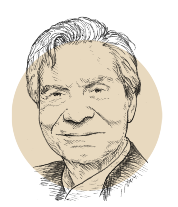While his latest film, An Officer and a Spy, about the Dreyfus Affair (in which he draws comparisons with his own legal troubles), was the highest-grossing movie in France, protests, cancelled screenings, and heated debates on social media have revealed major developments. According to Raphaël Liogier, a sociologist and philosopher working in Paris, Aix-en-Provence, and New York, and the author of Heart of Maleness: An Exploration, this change of attitude towards the filmmaker is the sign of a new collective awareness.
France-Amérique: Polanski has long been protected in France by intellectuals and the movie industry, who defended him against American puritanism. However, he has suddenly been blacklisted. What has changed?
Raphaël Liogier: We have to distinguish between two things. The fact that countries such as France and Poland refuse to extradite Polanski despite the charges brought against him in the United States is a legal and diplomatic issue. This is an age-old part of international relations. The real development is the new collective awareness, both in France and America, in the aftermath of #MeToo. We can no longer believe it is normal to use one’s status – as talented as one may be – to obtain sexual favors.
The American-born #MeToo movement was rejected by certain French men and women making a stand against puritanism in the name of courtly love. Are there still differences between our two countries, or has the American wave washed over France?
The meaning of #MeToo goes beyond our cultural differences. However, they serve as a pretext in both France and America for disguising the real problem. In the United States, the movement is seen as a demand for more formal restrictions and distance. In France, it is seen as preventing enjoyment, humor, and flirting. But we are missing the point on both sides of the Atlantic. The real issue is freedom – sexual and otherwise – but based on reciprocity.
Is the term “feminist revolution” excessive? If this is a revolution, should we fear slander, libel, and innocent victims?
This is certainly a revolution, not only in feminist terms, but in the achievement of a promised modernity: the right for all humans to enjoy the world equally. Women have been historically excluded from human rights, which were above all aimed at men. It took 150 years after the French Revolution of 1789 for them to get the vote. The full and exclusive enjoyment of property took even longer, and we are still striving for equal pay for equal work. However, the heart of the problem was overlooked until now: the most essential form of enjoyment, that of one’s own body! This is the true meaning of #MeToo. Of course, there are mistakes made, but they have nothing to do with the movement itself. In fact, there are very few people personally targeted with the hashtag, despite what we may believe.
Does this revolution apply to less-visible victims such as factory and office workers?
The French Revolution began with the uprising of the bourgeoisie. You need enough power, visibility, and resources to have an impact, and enough cultural baggage to realize you are being treated unfairly. Marx refers to the dominated fraction of the dominant class. In our case, celebrities (the dominant class) are the ones refusing to accept discrimination for being women (the dominated fraction). Society then gradually follows suit. In the United States, there is now a wave of demands from manual laborers, secretaries, and other female workers, who are tired of being ignored. This is the case of the iconic Ford factories, where several women are suing the manufacturer for sexual harassment.
=> Raphaël Liogier, Heart of Maleness: An Exploration, Other Press, January 28, 2020. 112 pages, 14.99 dollars.
Interview published in the January 2020 issue of France-Amérique.












